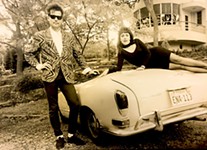Book Reviews
By Jesse Sublett, Fri., July 5, 2002

City of Bones
by Michael ConnellyLittle, Brown, 400 pp., $25.95
City of Bones is the eighth Harry Bosch novel since he first appeared in The Black Echo, Michael Connelly's smashing 1992 debut. Although the decade has aged and scarred his body, time hasn't mellowed the LAPD detective's edgy, brooding personality a bit. The author, meanwhile, has evolved from good to masterful. Every element is in place and in perfect pitch, from the weather and the traffic to the way a suspect's dilapidated trailer reeks of cat piss. It's New Year's Day, and a Laurel Canyon resident's dog has returned from a romp in the hills with a bone in his teeth -- a bone belonging to a 12-year-old boy, murdered almost a generation ago and buried in a shallow grave off Wonderland Avenue, near the spot where real-life porn superstar Johnny "Wad" Holmes was beaten to death in one of Hollywood's more lurid true crime stories. Bosch takes command of the crime scene the way Patton took command of a battlefield, and Connelly's control of language, mood, and rhythm is no less impressive. Writing about L.A. and doing it well isn't as easy as it looks -- the scenery, the weirdness, and the art-imitates-life-imitates-art-ad-infinitum history are so familiar to us that citizens around the world feel entitled to think of themselves as honorary Losangelenos.
One of the tricks that Connelly has down pat is detail, the telling, seemingly trivial, yet revelatory and timely fine print and grace notes about cops, criminals, and day-to-day reality in post-Rodney King L.A. There's the chief's edict that lights have to be burning in every station in the city 24 hours a day to assure citizens that the war against crime never sleeps, resulting in a zillion-dollar electric bill. There's the slang, such as "boot" for new police officers, and the faster-than-lightning grapevine that outs Bosch's mucho verboten affair with rookie cop Julia Brasher almost before the end of their first kiss. And yet, like the best musicians, Connelly's sharpest edge over the competition may be in his keen sense of what to leave out. The reader feels the emotional turmoil and gritted-teeth tenacity of Bosch in his sometimes sneering non-responses to questions, and the reactions of the many colleagues he annoys or angers. Because of its resonance with Bosch's own upbringing as an orphan, this case seems to promise from the very beginning to become the most challenging and deeply troubling of his career. And yet, it certainly isn't an expectation of a happy ending that prompts one to take Bosch at his word when he vows, "I'm going to get this guy."








